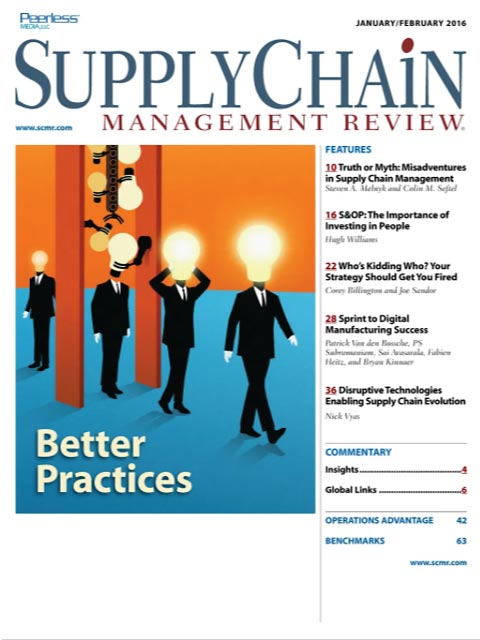Sorry, but your login has failed. Please recheck your login information and resubmit. If your subscription has expired, renew here.
January-February 2016
It’s a new year. Most of us will have new budgets to meet and new expectations for the performance of our supply chains. Many will look to best practices from industry leaders to improve our operations. But, are best practices really the “best” way to go? As you think about 2016, I hope you ask the question: What better practices can I adopt for my supply chain? Browse this issue archive.Need Help? Contact customer service 847-559-7581 More options
Before Galileo’s death nearly 400 years ago, Conventional Wisdom held that the earth—and not the sun—was the center of the universe. More recently, Conventional Wisdom held that smoking, drinking, stress, and diet caused peptic ulcers. Then, two Australian scientists, Robin Warren and Barry J. Marshall, showed that bacteria caused ulcers. Meanwhile, The Wisdom of Crowds, a book by James Surowiecki, contends that the collective conclusions by groups of individuals are often better than those made by any single member of the group.
Well, maybe; maybe not. Remember that Galileo’s belief that the sun was the center of the universe was ultimately proved correct. Maybe conventional wisdom isn’t always right.
The same can be said of supply chain management. Since it was first introduced in 1982, supply chain management has experienced a series of transformations. Initially seen as a better way of reducing costs and leveraging resources, it has gone from being a function (purchasing, for example) to being a cross-functional, strategic capability. More importantly, it is now transforming from an art—something that is learned only through trial, error, and experience—to a science. A hallmark of science is the continuous testing of commonly held beliefs.
 |
This complete article is available to subscribers
only. Click on Log In Now at the top of this article for full access. Or, Start your PLUS+ subscription for instant access. |
SC
MR
Sorry, but your login has failed. Please recheck your login information and resubmit. If your subscription has expired, renew here.
January-February 2016
It’s a new year. Most of us will have new budgets to meet and new expectations for the performance of our supply chains. Many will look to best practices from industry leaders to improve our operations. But, are… Browse this issue archive. Access your online digital edition. |
Download Article PDF |
Before Galileo's death nearly 400 years ago, Conventional Wisdom held that the earth—and not the sun—was the center of the universe. More recently, Conventional Wisdom held that smoking, drinking, stress, and diet caused peptic ulcers. Then, two Australian scientists, Robin Warren and Barry J. Marshall, showed that bacteria caused ulcers. Meanwhile, The Wisdom of Crowds, a book by James Surowiecki, contends that the collective conclusions by groups of individuals are often better than those made by any single member of the group.
Well, maybe; maybe not. Remember that Galileo's belief that the sun was the center of the universe was ultimately proved correct. Maybe conventional wisdom isn't always right.
The same can be said of supply chain management. Since it was first introduced in 1982, supply chain management has experienced a series of transformations. Initially seen as a better way of reducing costs and leveraging resources, it has gone from being a function (purchasing, for example) to being a cross-functional, strategic capability. More importantly, it is now transforming from an art—something that is learned only through trial, error, and experience—to a science. A hallmark of science is the continuous testing of commonly held beliefs.
 |
SUBSCRIBERS: Click here to download PDF of the full article. |
SC
MR

Latest Supply Chain News
- April Services PMI declines following 15 months of growth, reports ISM
- Attacking stubborn COGS inflation with Digital Design-and-Source-to-Value
- Despite American political environment, global geopolitical risks may be easing
- Joseph Esteves named CEO of SGS Maine Pointe
- Employees, employers hold divergent views on upskilling the workforce
- More News
Latest Podcast

 Explore
Explore
Latest Supply Chain News
- April Services PMI declines following 15 months of growth, reports ISM
- Attacking stubborn COGS inflation with Digital Design-and-Source-to-Value
- Despite American political environment, global geopolitical risks may be easing
- Joseph Esteves named CEO of SGS Maine Pointe
- Employees, employers hold divergent views on upskilling the workforce
- April manufacturing output slides after growing in March
- More latest news
Latest Resources

Subscribe

Supply Chain Management Review delivers the best industry content.

Editors’ Picks





